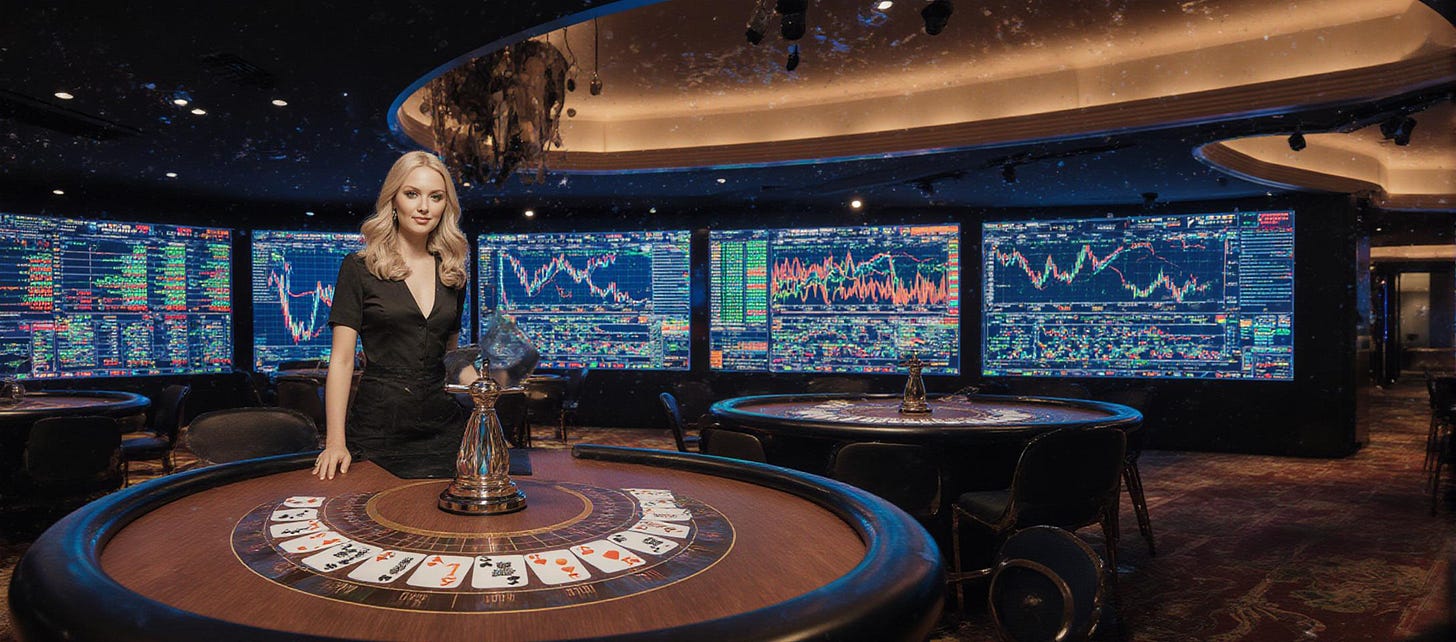Fortune’s Dice: Why Luck Rules Wall Street More Than Reason
What ancient philosophers and modern quants get wrong about randomness, risk, and our delusions of control.
So, every flicker of a ticker on Wall Street is a hymn to rationality—or so we’re told. Data, models, forecasts, all designed to squeeze uncertainty from the market’s marrow. But lurking beneath these numbers is a shadow: luck, chance, Fortuna herself, rolling her dice over our best-laid trades. More fortunes are made—and lost—by her caprice than by any human cunning.
Ancient History
Long before spreadsheets, ancient thinkers wrestled with randomness. Stoics like Seneca and Epictetus counseled acceptance of fate, warning against hubris in the face of life’s unpredictable winds. Nietzsche decried our desperate search for order in chaos. As humans, our wiring craves patterns, but markets often play by rules that defy our comprehension.
The “Efficient Market Hypothesis” seduces us into believing that prices always reflect perfect rationality. Yet, history is littered with spectral shocks—the Black Monday crash, dot-com delirium, the flash crash, teaching us repeatedly that models crumble precisely when luck (or disaster) strikes hardest. Quants and mathematicians devise elegant formulas, yet their power wanes at the market’s ragged edge.
“We are in the habit of seeing the world as a mechanism, but it is a lottery.”
—Friedrich Nietzsche, The Gay Science (1882)
Probability vs. Causality
We crave certainty, but trading is a bet on probabilities:
Probability admits that luck decides half the story. Causality claims mastery and control, and we know that even the strongest strategies can lose—spectacularly—on Fortune’s dice roll.
The Dice-Rollers of Wall Street
The difference between “skill” and “luck” is often smaller (and more fleeting) than we wish.
When we see a trader on a “lucky streak,” we ask, “How did they know?” But the real question should be, “What was their payoff structure?”
The market is filled with “monkeys” throwing darts. But the monkey who buys a single lottery ticket and wins $100 million isn’t a “genius,” just as the trader who buys a cheap, out-of-the-money option on a company just before it’s acquired isn’t a “prophet.”
Both were simply “long convexity.” They placed a bet with a small, defined downside (the cost of the ticket, the price of the option) and an explosive, asymmetric upside. The “skill” wasn’t in the prediction; it was in the structure. They engineered a situation where being “lucky” paid 1,000-to-1.
The fractal-stack-wisdom in a world ruled by Fortuna
It is not “humility.” It is not “diversification” (which is just a way to ensure mediocrity). It is not “preparing for storms” (which is purely defensive).
The true wisdom is “Engineering Asymmetry.”
It’s a complete inversion of the common advice. You stop trying to predict the future. You stop trying to be “right.” Instead, you structure your portfolio—and your life—around a single, powerful question:
“What happens if I’m exceptionally right, just once?”
This means seeking out opportunities with capped downside and explosive upside. It means buying the cheap “call options” on life:
Sending the cold email (Downside: 5 minutes. Upside: A new career).
Starting the side project (Downside: $1,000. Upside: A new company).
Buying the cheap, out-of-the-money option (Downside: The premium. Upside: 100x).
You build a system that survives the bad luck (because your losses are defined) but thrives on the good luck. You are no longer afraid of randomness; you are harvesting it.
Conclusion: Build a Sail for Fortuna’s Wind
Luck is the market’s fuel. It is the wind, the chaos, the raw energy of potential.
The fatalist may see this wind as an adversary, a force to be reckoned. They build a bunker and wait in resignation.
We see it as a force to be channeled: we build sails. We position ourselves to be propelled by it.
So, stop trying to predict the dice toss and build a system that pays you a fortune if lucky and costs you almost nothing if you’re not.
That is the only strategy that matters.


